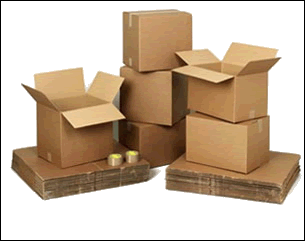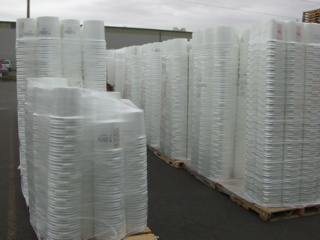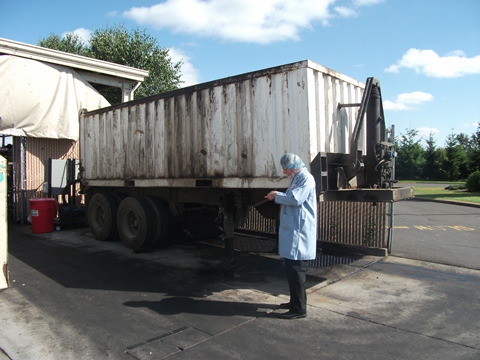By Vicki Matranga, Design Programs Coordinator
Sustainability is vital to a company’s strategic positions, performance and brand image. At the 2012 International Home + Housewares Show, we learned about many directions and issues in sustainability. We heard from industry insiders at the Innovation Theater and the Going Green display about environmentally sustainable materials, reduced use of natural resources in production, more efficient packaging and legal issues in advertising.
This summer series of blog posts updates what was presented at the Show as we continue the conversation with some of the industry leaders who appeared there. IHA introduces its members to service providers who can help them make more sustainable decisions in their supply chains and production as well as benchmark best practices.
Trash is a mounting problem worldwide, as increasing production and consumption in emerging economies build environmental and economic pressures everywhere. Rising costs of waste disposal focus attention on local practices and highlight opportunities in waste management. It can be a revelation to discover profit opportunities in trash.
Waste Revelation LLC, based in Valparaiso, Ind., can help a business reduce expenses and increase revenue sources. By advising clients “Don’t throw your money out with the trash,” Waste Revelation audits waste streams in varied industries, including manufacturing, food processing, steel fabrication, commercial distribution and construction. Begun in a garage office in South Carolina 11 years ago, the company now has thousands of client locations in the U.S. and Canada. Six Sigma methods and Lean Manufacturing are also standard.
We’re speaking with Cole Doolittle, owner, general manager and professional engineer, to learn about how Waste Revelation can help companies face today’s complex waste disposal challenges.

Cole, tell us about your company’s name.
“Revelation” reflects our goal of zero waste. We want to exemplify the practice of taking what you’ve got and making it better, not just starting anew and discarding the old. It’s a mentality we practice with our clients. By introducing sustainability, we are trying to make good out of something that was trash.
Can you outline your approach to an analysis?
Sustainability and environmental responsibility are not just terms for scientists anymore; when our customers ask us about these questions, we find the best answers for them. Today there are only a few ways to achieve increased margins—the key being maintaining competitive product prices while reducing operational expenses.
Waste Revelation develops customized, specialized programs for our clients. Our audit teams investigate a company’s total operation, sometimes in multiple sites across the country, to examine the packaging of inbound supplies to outbound products, legal compliances and engineering, to find flexible savings and revenue generating solutions. We implement approved changes and track results to demonstrate increased savings and revenues. We are value-based consultants; we win when you win. We partner with our clients to share net financial gains, so our interests align with our clients’ to increase cost savings.
In-house accountants or purchasing agents might not be aware of alternative in materials choices, waste haulers, recyclers and brokerage firms. Our in-depth studies and analyses yield detailed spreadsheet reports to help our clients optimize their returns and find the best fit for their service providers.
Let’s talk about some examples of how this can work.

Cardboard boxes are a typical situation. It’s pretty standard practice that companies recycle the boxes their supplies arrived in. They don’t even stop to think about it. We come into the plant and might see additional opportunities for sale for reuse. They might double the value if they don’t bail the boxes, but flatten and stack them for reuse. It’s a less common practice because of the complexities involved, such as print on the boxes, holes within the box, dimensions, design of folds, grade of box, etc. However, the end result is that we have frequently gained our clients revenue of $0.12 to $0.22 for an individual average-size box. Larger boxes can be of greater revenue value. This can easily double the value if you’re presently selling cardboard boxes baled for recycling, and most certainly better that recycling in loose form. We take the boxes and handle the resale and transportation. And if we suggest changes upstream with how the boxes are printed or made, a company’s savings can be even greater.
Waste boxes can become a revenue source
How about other materials or specialty items?

With a client that manufactures freeze-dried food products, we looked at the packaging/handing of the materials of their ingredients. Some of the ingredients were mixed on site with plastic HDPE pails. First we changed the color of the plastic buckets that were purchased—replacing the white pails with a natural that had no tinted color. Once the pails were no longer used for mixing, the color change allowed for a two-fold increase on the resale value of the plastic, because the plastic regrind industry prefers the natural coloring. Now this client is working toward a reuse program—aiming to wash these pails and internally reuse them five times before discarding for recycling. The end result takes an expense that was $1.00 spent for each new pail purchased down to less than an estimated $0.25 for like needs met.
Situations can change and many operations overlap and have multiple impacts. Can you give us some idea about how you deal with such issues?
Impacts vary over time, as do costs. We invest time with each client to determine their specific needs and pay attention to the consequences of upgrading their existing operations. We have to consider the whole picture because altering one facet of an operation impacts others. If cardboard is removed from the standard garbage stream, for instance, more room becomes available in the dumpsters. We worked with a commercial baking company whose warehouse distribution network would throw out stale bread. We recommended that the warehouse network return the stale bread in the same bins in which the fresh bread arrived, so that the baking company could reuse the bins and recycle the old bread for animal feed operations. This change created another challenge, however—that of segregating the stale returns from the fresh bread. In this case, the baking company was large enough to make this new socially responsible plan financially worthwhile as well.

Thank you, Cole, for inspiring readers to think in new ways about how small changes can have big impacts on our environment and a company’s financial performance. Waste Revelation LLC can reveal some great opportunities for businesses in many areas.
Learn more about the company’s services by visiting www.wasterev.com


